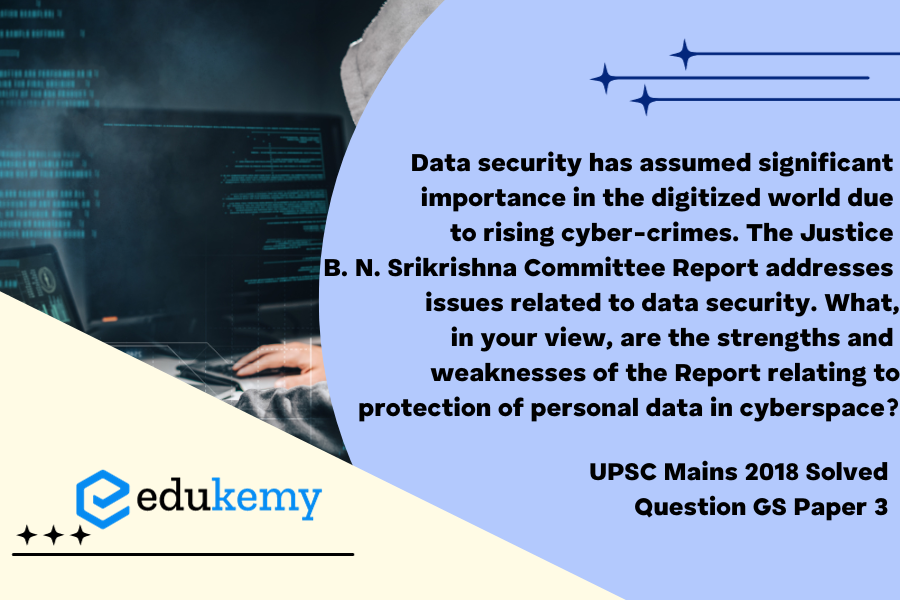In an era dominated by rapid digitalization, the paramount concern of safeguarding sensitive information has propelled data security to the forefront of global discourse. The escalating prevalence of cyber crimes has accentuated the need for robust frameworks to ensure the protection of personal data in cyberspace. The Justice B. N. Srikrishna Committee Report stands as a seminal document that meticulously scrutinizes and addresses various facets of data security. One of the report’s notable strengths lies in its comprehensive approach, encompassing legal, technological, and ethical dimensions of personal data protection. The report acknowledges the dynamic nature of technology and proposes a regulatory framework adaptable to the evolving cyber landscape. Additionally, the emphasis on user consent and the Right to be Forgotten reflects a commitment to individual privacy rights. However, the report is not without its shortcomings. One notable weakness is the potential for regulatory overreach, as the proposed Data Protection Authority might face challenges in balancing privacy protection with fostering innovation. Furthermore, there is a concern regarding the enforceability of certain recommendations and the feasibility of implementation in a diverse and complex digital environment. Striking the delicate balance between safeguarding personal data and fostering innovation remains a challenge, and the report’s efficacy in achieving this equilibrium requires continuous scrutiny and adaptation to the ever-changing cyber-threat landscape.
Tag: Basic of cyber security. Challenges to internal security through communication network, role of media and social networking sites in internal security challenges.
Contents
Decoding the Question:
- In Introduction, write of significance of data.
- In Body,
- Justify significance of data security due to rising cybercrimes.
- Discuss recommendations given by Justice SriKrishna Committee and critically analyze (strength and weakness) the report with respect to personal data in cyberspace.
- Conclude your answer underlining the importance of data protection from cyber-attacks.
Answer:
Data is very significant in any country’s economy and social development and the Supreme Court (SC) called data as “NEW OIL”. Data is the collection of facts related to an individual or a group or organization. Personal Data can be understood by personal footprint in the digital world. It means what a person likes, his dislike etc. This generates an immense amount of data which is used by various companies (like, recent WhatsApp issue) or state for their benefit.
The Committee under the chairmanship of Justice B. N. Srikrishna was constituted to examine issues related to data protection, recommend methods to address them, and draft a data protection law. The objective was to ensure growth of the digital economy while keeping personal data of citizens secure and protected.

Shri Krishna Committee’s recommendations:
- The processing (collection, recording, analysis, disclosure, etc) of personal data should be done only for “clear, specific and lawful” purposes.
- Processing personal data for function of state.
- The committee recommends the ‘right to be forgotten’.
- Personal data will need to be stored on servers located within India, and transfers outside the country will need to be subject to safeguards.
- The “sensitive” personal data (such as passwords, financial data, sexual orientation, biometric data) processed only with explicit consent.
- A Data Protection Authority which is supposed to “protect the interests of data principals”, prevent misuse of personal data and ensure compliance with the safeguards and obligations under the data protection framework by corporations, governments, or anyone else.
Strengths of Data Protection Report:
- The Committee noted that consent is treated as one of the grounds for processing personal data.
- One in three internet users across the world is children under the age of 18. A data protection law must sufficiently protect their interests, while considering their vulnerability, and exposure to risks online.
- It discussed the principle where personal data must be collected for a specified purpose only.
- One of the principles of data protection is that a person whose data is being processed should be able to influence the processing. This includes the right to confirm, access, and rectify the data.
Weaknesses of data protection report:
- Though the draft bill addresses various issues facing the data ecosystem in India, it falls short on key principles that are at the core of a robust data protection framework.
- The committee recommended personal data of individuals can be processed for the exercise of any functions of the state. This can be done without the consent of the individual when it comes to provide service or any benefits to the individuals. This recommendation countering what the SC said in Puttaswamy Case regarding informed consent.
- One key subject is missing from the draft report reforms in privacy concern with surveillance laws.
Conclusion
India’s rising internet users and generation of immense data needs strong data protection laws and enforcement of the same to protect personal data from cyber-attacks. In order to achieve Digital India targets and reap the benefits of the digital economy, a strong regime of data protection is needed.
In case you still have your doubts, contact us on 9811333901.
For UPSC Prelims Resources, Click here
For Daily Updates and Study Material:
Join our Telegram Channel – Edukemy for IAS
- 1. Learn through Videos – here
- 2. Be Exam Ready by Practicing Daily MCQs – here
- 3. Daily Newsletter – Get all your Current Affairs Covered – here
- 4. Mains Answer Writing Practice – here


